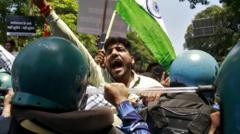Amid rising hostilities, Pakistan has suspended all visa services for Indian nationals after a militant attack in Kashmir, further complicating relations between the neighboring countries.
**Escalating Tensions: Pakistan Halts Visas for Indians Following Fatal Kashmir Attack**

**Escalating Tensions: Pakistan Halts Visas for Indians Following Fatal Kashmir Attack**
Pakistan takes immediate retaliatory actions against India after the tragic death of 26 tourists in Kashmir, raising diplomatic stakes in the region.
The recent attack in Indian-administered Kashmir, which resulted in the death of 26 tourists, has heightened tensions between India and Pakistan, prompting immediate actions from both sides. Pakistan's government promptly suspended all visas for Indian nationals under an exemption scheme, expelled certain Indian diplomats, and shuttered its airspace to Indian flights in response to the attack.
Officials in India have identified three out of four alleged assailants, asserting that two of them are Pakistani nationals while the third is a local Kashmiri man. The Indian police accuse these men of being associated with the Pakistan-based militant group Lashkar-e-Taiba (LeT). However, Pakistan has vehemently denied any involvement, dismissing India's claims as unfounded and lacking credible evidence, as stated by the National Security Committee.
Prime Minister Narendra Modi has vowed to pursue the identified terrorists and their backers "to the ends of the Earth," promising that they will face severe repercussions for the attack, which he described as an assault on India's spirit. In retaliation, India also made significant diplomatic moves, including the immediate shutdown of the Attari-Wagah border and the cancellation of visas for Pakistani nationals.
Furthermore, Pakistan's response included the rejection of India's suspension of the Indus Water Treaty, a crucial agreement governing water sharing between the two nations. Pakistan warned that any attempts to disrupt or divert water resources would be construed as an act of war.
In the wake of the attack, approximately 1,500 individuals across Kashmir have been detained for questioning, and daily life is cautiously resuming with schools and businesses reopening. The Indian police have offered a substantial reward for information leading to the attackers, amid emotional farewells for the victims' families as their bodies return home.
Reports are circulating about harassment of Kashmiri students in various parts of India following the attack, highlighting the rising tensions on the ground. Videos have emerged showing threats aimed at Kashmiri Muslim students, adding another layer of complexity to the already strained relations between the two countries.
As both nations continue to navigate this crisis, the situation in Kashmir remains precarious, underscoring the risks of further military escalation.
Officials in India have identified three out of four alleged assailants, asserting that two of them are Pakistani nationals while the third is a local Kashmiri man. The Indian police accuse these men of being associated with the Pakistan-based militant group Lashkar-e-Taiba (LeT). However, Pakistan has vehemently denied any involvement, dismissing India's claims as unfounded and lacking credible evidence, as stated by the National Security Committee.
Prime Minister Narendra Modi has vowed to pursue the identified terrorists and their backers "to the ends of the Earth," promising that they will face severe repercussions for the attack, which he described as an assault on India's spirit. In retaliation, India also made significant diplomatic moves, including the immediate shutdown of the Attari-Wagah border and the cancellation of visas for Pakistani nationals.
Furthermore, Pakistan's response included the rejection of India's suspension of the Indus Water Treaty, a crucial agreement governing water sharing between the two nations. Pakistan warned that any attempts to disrupt or divert water resources would be construed as an act of war.
In the wake of the attack, approximately 1,500 individuals across Kashmir have been detained for questioning, and daily life is cautiously resuming with schools and businesses reopening. The Indian police have offered a substantial reward for information leading to the attackers, amid emotional farewells for the victims' families as their bodies return home.
Reports are circulating about harassment of Kashmiri students in various parts of India following the attack, highlighting the rising tensions on the ground. Videos have emerged showing threats aimed at Kashmiri Muslim students, adding another layer of complexity to the already strained relations between the two countries.
As both nations continue to navigate this crisis, the situation in Kashmir remains precarious, underscoring the risks of further military escalation.





















